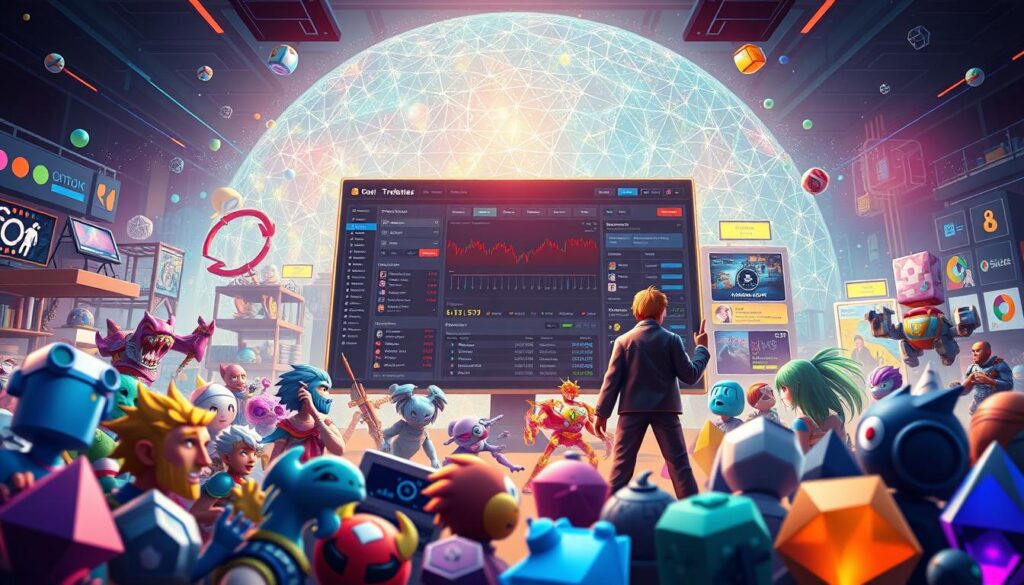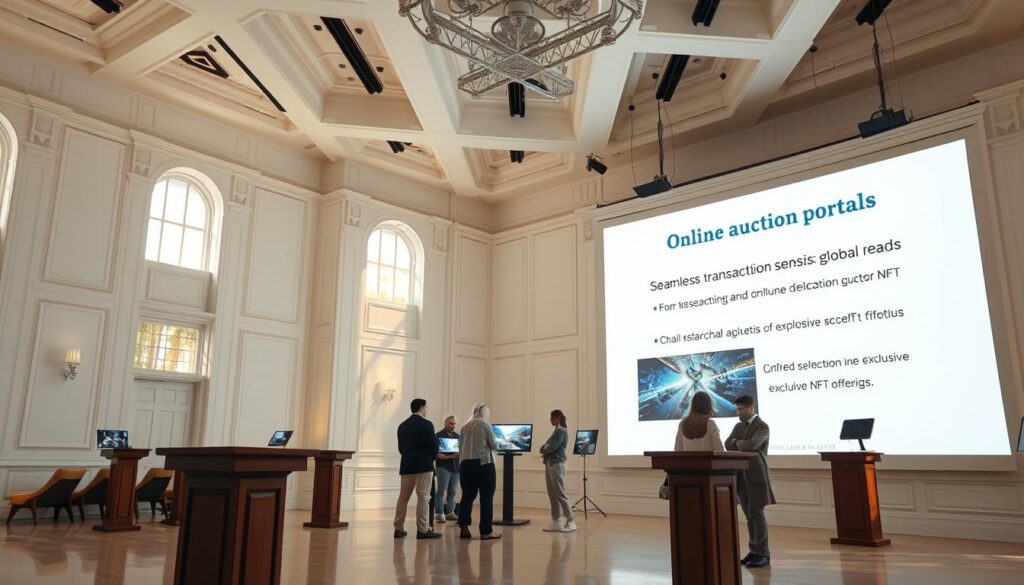The world of digital collectibles is expanding at a remarkable pace. For entrepreneurs and established businesses, this presents a significant opportunity. This guide serves as your essential roadmap to understanding this dynamic sector.
We will explore the landscape of digital marketplaces built on blockchain technology. These spaces allow for the trade of unique digital assets through competitive processes. This creates exciting pricing dynamics driven by real-time participation.
The demand for specialised digital marketplaces is growing as these assets become mainstream. They are appearing in industries like digital art, music, and virtual real estate. Selecting the right solution is crucial for capitalising on this tokenised economy.
This resource covers everything from core technology stacks to development processes. For a deeper look at the technical side, consider this detailed guide on NFT auction platform. Our goal is to provide you with actionable information to make informed decisions.
Key Takeaways
- This guide explores the landscape for businesses entering the digital collectibles market.
- Specialised digital marketplaces facilitate the trade of unique assets through competition.
- Understanding how to evaluate these solutions is crucial for success.
- The resource covers technology stacks, development, and innovative models.
- It provides actionable information for both established businesses and startups.
Understanding the Digital Auction Landscape
Blockchain-based collectibles have created a new paradigm for digital ownership and value exchange. This landscape has evolved from early experiments into a sophisticated ecosystem where unique items find their true worth through competitive processes.
Evolution of NFT Auctions
The journey began with simple blockchain experiments testing digital ownership concepts. Today, these processes have matured dramatically across multiple industries.
Artists, musicians, and gaming companies now leverage these methods to monetise unique creations. Some sales have achieved multi-million dollar results, capturing global attention.
| Auction Format | Key Feature | Best For | User Engagement |
|---|---|---|---|
| English Auction | Ascending bids | High-value items | Very high |
| Dutch Auction | Descending price | Multiple editions | Moderate |
| Sealed-bid | Private offers | Confidential sales | Targeted |
| Timed Auction | Fixed duration | Urgency creation | Peak activity |
Market Trends and User Engagement
Current trends show these competitive methods becoming the preferred choice for trading valuable digital assets. The bidding process naturally discovers true market value while creating excitement.
User participation significantly exceeds traditional marketplace interactions. The time-limited, competitive nature triggers psychological responses that keep people actively involved throughout the process.
As we move through 2025, specialised spaces are emerging for specific categories like generative art and virtual real estate. Each offers tailored features for their target audiences.
Core Elements of NFT Auction Bidding Platform System
The technological foundation of a digital collectibles marketplace relies on two critical components working in harmony. These elements automate complex processes and guarantee security for all participants.
They transform a simple marketplace into a dynamic, trustless environment for valuing unique assets.

Smart Contract Automation
Self-executing contracts represent the backbone of this technology. They handle the entire lifecycle of a sale automatically.
This includes validating offers, enforcing rules, and managing payments. Every transaction is recorded permanently on the blockchain, creating total transparency.
Participants benefit from real-time processing and automatic fund handling. This eliminates the risk of human error or manipulation.
Secure Wallet Integration
Connecting a personal cryptocurrency wallet is essential for participation. Popular options like MetaMask and Trust Wallet provide a secure gateway.
This integration removes the need for traditional usernames and passwords. Instead, users confirm actions with their private keys.
It gives people complete control over their digital assets during the competitive process. This security is vital for building user confidence in the marketplace.
NFT Auction Platform Features and Technology Stack
A successful digital marketplace is powered by a synergy of frontend, backend, and blockchain components. This integration defines the core features and overall performance.
The technology stack must be both powerful and adaptable. It handles everything from the user interface to complex security protocols.
Frontend and Backend Innovations
Modern web interfaces rely on frameworks like React.js. They create dynamic pages that update instantly during live sales.
This provides an engaging experience for every user. The backend, often built with Python, manages data and application logic securely.
Blockchain and AI Integration
Blockchain networks like Ethereum provide a trusted foundation for transactions. Smart contracts automate the entire sales process reliably.
Artificial intelligence adds a smart layer to the platform. It can offer personal recommendations and help detect unusual activity.
The development of these systems requires careful planning. Each technology must work in harmony to create a seamless marketplace.
Step-by-Step Process to Develop an NFT Auction Platform
Creating a competitive digital asset exchange involves multiple interconnected phases that build upon each other. This structured approach ensures your project evolves from concept to fully functional marketplace efficiently.

Idea Validation and Requirement Analysis
The initial stage focuses on thorough market research and strategic planning. You must identify your target audience and analyse competitor offerings carefully.
This phase establishes the foundation for your entire development journey. Clear business objectives and revenue models guide subsequent technical decisions effectively.
Design, Development, and Testing Phases
Once requirements are solidified, the creative and technical work begins. The design phase creates intuitive user interfaces that facilitate seamless navigation.
Development follows, integrating blockchain technology with frontend and backend systems. Comprehensive testing ensures all components function reliably before launch.
This systematic process minimises risks while delivering a robust final product. Each stage builds upon the previous one, creating cohesion throughout the project.
Benefits of Online Auction Portals for Digital Assets
Digital collectible marketplaces offer distinct advantages that traditional sales channels cannot match. These benefits create a more efficient, secure, and engaging environment for everyone involved.

Global Reach and Authentic Ownership
One of the most powerful benefits is global accessibility. An online auction portal instantly connects a creator in one country with collectors worldwide. This dramatically expands the potential buyer pool.
Blockchain technology provides irrefutable proof of provenance. Every transaction is permanently recorded. This eliminates concerns about counterfeits and builds immense trust.
Transparency Through Smart Contracts
Self-executing contracts automate the entire process. All rules and bid histories are visible to any participant. This creates unprecedented fairness.
These digital agreements also remove intermediaries. This lowers costs for buyers and sellers. It also speeds up the final settlement significantly.
For businesses looking to capitalise on these advantages, partnering with experts for professional development services is a crucial step. Real-time bidding environments create excitement that often drives final values higher than fixed-price sales.
Innovative Auction Models and Software Features
The strategic implementation of various sales formats creates distinct psychological and economic advantages for both creators and collectors. These models transform simple transactions into engaging experiences that drive participation and value.

Exploring Different Auction Types
Beyond traditional formats, several specialised models cater to specific market needs. Penny auctions increase prices minimally with each bid, creating extended engagement. Buy It Now options allow immediate purchases at set prices.
Peak auctions concentrate activity during high-traffic periods. Seat models require entry fees, filtering serious collectors. Dutch formats start high and decrease until someone claims the asset.
Each format serves different seller objectives and buyer behaviours. The right choice depends on the digital collectibles being offered and target audience preferences.
Unique Features for Enhanced User Experience
Modern exchanges incorporate sophisticated features that improve the overall experience. Real-time bidding systems ensure fairness by extending time when last-minute bids occur. This prevents strategic sniping tactics.
Creator royalty mechanisms automatically compensate original artists on secondary sales. AI recommendation engines analyse user behaviour to suggest relevant digital assets.
Additional enhancements include wishlists, automated bid suggestions, and social features. These tools help buyers track desired items and make informed bidding decisions.
Sellers benefit from comprehensive profile systems and category management. These features help organise diverse collections effectively while building trust with potential bidders.
Why Choosing the Right Development Company Matters
Partner selection in the development phase establishes the groundwork for either sustainable growth or operational challenges. The technical expertise of your chosen development company fundamentally shapes your project’s success.
Specialised knowledge separates exceptional partners from general web developers. This distinction becomes crucial when building complex digital environments.
Expertise in NFT Marketplace Development
A competent development company possesses deep understanding of blockchain protocols and smart contract security. They integrate cryptocurrency wallets and real-time systems seamlessly.
This specialised app development requires knowledge most general firms lack. Companies like Cyblance demonstrate this through their cutting-edge technology implementations.
Proven Track Record and Custom Solutions
Established firms like AppDupe and WeAlwin showcase extensive portfolios of successful projects. Their experience across 250+ deliveries provides valuable insights.
Custom solutions tailored to specific business models create competitive advantages. This approach ensures your marketplace development meets unique audience needs effectively.
The right development partner offers comprehensive post-launch support. This ongoing relationship proves essential for long-term business success in dynamic digital spaces.
Conclusion
As blockchain technology achieves mainstream adoption, the competitive advantages of well-designed digital exchanges become increasingly apparent. This comprehensive guide has illuminated the path toward successful participation in the tokenised economy.
The strategic implementation of specialised marketplaces offers significant business benefits including global reach and transparent operations. Proper management ensures optimal performance and visibility for all participants.
Forward-thinking enterprises that invest in robust solutions today position themselves to capitalise on the evolving digital landscape. The right approach creates lasting value for creators, collectors, and the broader market.
FAQ
What are the primary advantages of using a digital marketplace for collectibles?
These marketplaces offer global visibility for sellers and a vast selection for buyers. They leverage blockchain technology to provide proof of authentic ownership and a transparent transaction history for every digital asset, enhancing trust within the community.
How does smart contract automation benefit the auction process?
Smart contracts automatically enforce the auction rules, managing bids and finalising sales without manual intervention. This automation increases security, reduces the potential for disputes, and ensures a fair and efficient experience for all participants.
What should I look for in a web development company for this project?
Seek a firm with specific experience in marketplace development and a strong understanding of blockchain integration. A proven track record in creating scalable, high-performance applications and the ability to deliver custom solutions tailored to your business needs are crucial factors.
Can different auction models be integrated into one platform?
Absolutely. A sophisticated system can support various models, such as timed auctions and open ascending bids. This flexibility allows sellers to choose the format that best suits their asset, attracting a wider range of bidders and maximising engagement.
How important is wallet integration for users?
Secure wallet integration is fundamental. It allows users to manage their digital assets and funds directly within the app, providing a seamless and secure experience. This feature is essential for building user confidence and facilitating smooth transactions.
What role does AI play in an advanced auction system?
Artificial intelligence can significantly enhance the user experience. It can be used for personalised recommendations, fraud detection, and analysing market trends. This technology helps in creating a more intelligent and responsive environment for buying and selling.


No comments yet